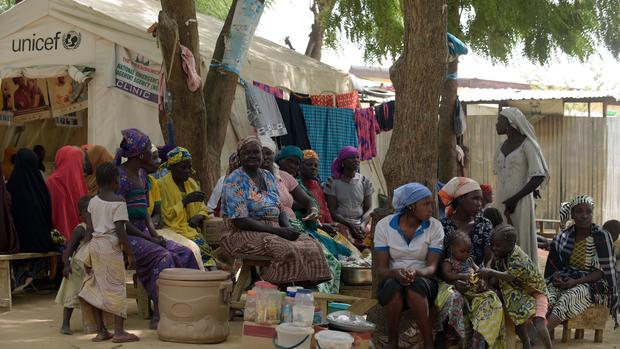Why are world powers unable to stop Boko Haram?
UNITED NATIONS --Two years ago Thursday, the world watched in horror as276 girls were abducted from their school in Chibok, Nigeria, by the group known as Boko Haram, a militant Islamist group that swears allegiance to the Islamic State of Iraq and Syria (ISIS).
Fifty-seven of the girls later escaped, but most have not -- and the situation has only gotten worse. The kidnappings prompted a global campaign, #BringBackOurGirls, but experts say violence in the region has impeded the girls' rescue and the world's attention has shifted to other crises.
To show how dire the situation has become, the U.N. children's agency, UNICEF, released a report on Tuesday showing that the number of children involved in suicide bombing has risen tenfold in the last year in the Lake Chad region, which includes Nigeria, Cameroon, Chad and Niger.
One in every five suicide bombings is perpetrated by a child. Three-quarters of them are girls as young as eight years old. They are victims, the U.N. says, of slavery and rape.
The report, "Beyond Chibok," says 2.3 million people have been forced out of their homes in the last three years. And the other findings are equally grim.
"Boys are forced to attack their own families to demonstrate their loyalty to Boko Haram, while girls are exposed to severe abuse including sexual violence and forced marriage to fighters," the report states. "Some are also used to carry or detonate bombs."
Laurent Duvillier, spokesperson for UNICEF in West & Central Africa, told CBS News that the world was shocked by the 2014 abduction. "But what did not get so much attention is what happened after this: over 2,000 women and girls have been abducted since then in about four countries, not just Nigeria."
Duvillier continued, "What we see today is that the humanitarian situation has seriously deteriorated. One year ago, on the first anniversary of Chibok, there were 800,000 people displaced; today, 1.3 million children alone are displaced, an increase of 60 percent."
Duvillier and other experts on the ground say that military forces in all four countries have make gains, liberating areas and people, but the abductions continue and, as areas are liberated, the humanitarian need is even greater.
The report details the stigma associated with children who have been freed, some ostracized, others killed, out of fear that they might turn against their communities.
There is also a chronic nutrition crisis. Toby Lanzer, the Assistant Secretary-General and Regional Humanitarian Coordination for the Sahel of Office for the Coordination of Humanitarian Affairs (OCHA), told reporters at U.N. Headquarters on Tuesday that the world should take note, because a migration crisis may follow when the "poorest of the poor" are subject to such extreme violence, abuse, the effects of climate change, and malnutrition.
"The suffering of some 30,000 people in Bama was as acute as I have seen," Lanzer said.
Deputy U.S. State Department spokesman Mark Toner said Tuesday the U.S. is delivering over $240 million in development and humanitarian assistance to the Lake Chad region.
"The United States continues to assist the Nigerian government's efforts to locate and bring home all those who have been kidnapped by Boko Haram with intelligence and advisory support," Toner said.
"Boys and girls affected by Boko Haram violence are faced with an extremely difficult situation, but I would not qualify the situation as intractable; there are many actors, including the United Nations, engaged in trying to improve the protection of children in Nigeria and neighboring countries," Leila Zerrougui, the Special Representative of the Secretary General for Children and Armed Conflict, told CBS News.
"The conflict's impact on education is extremely concerning," Zerrougi said. "Hundreds of thousands of children are missing out on their education. Recovering from personal trauma, from the trauma of conflict, is key to help the next generation build the peace they deserve."
